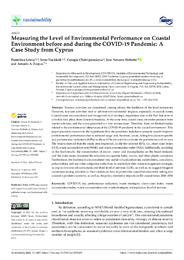Resumen :
Tourism activities are considered, among others, the backbone of the local economies.
However, tourism activities lead to adverse environmental impacts, especially in coastal zones.
Coastal areas are considered and recognized as of strategic importance due to the fact that several
activities take place, from leisure to business. At the same time, coastal areas are under pressure from
tourist activities, and the waste generated is a very serious issue. Therefore, there are limited studies
related to the environmental dimensions of the COVID-19 pandemic in the coastal environment. This
paper provides answers to the hypothesis that the pandemic lockdown scenario would improve
environmental performance due to reduced usage and, therefore, waste, taking into account specific
key performance indicators (KPIs) as these KPIs are used to evaluate the performance of an area.
The results showed that the study area improved, as did the selected KPIs, i.e., clean coast index
(CCI), waste accumulation rate (WAR), and waste accumulation index (WAI). Additionally, according
to the final results, the concentration of micro-, meso- and macroplastics on the beach reduced,
and the main issues remained the solutions on cigarette butts, straws, and other plastic containers.
Furthermore, the final results are considered very useful to local authorities, stakeholders, consultants,
policymakers, and any other competent authorities, to reschedule their waste management strategies,
to improve waste infrastructures and their level of services (LOS), as well as, to suggest frequent
awareness-raising activities to their visitors on how to protect the coastal environment, taking into
account a pandemic scenario, as well as, the policy alternative impacts on EU coastal zones 2000–2050.
|
 La licencia se describe como: Atribución-NonComercial-NoDerivada 4.0 Internacional.
La licencia se describe como: Atribución-NonComercial-NoDerivada 4.0 Internacional.
.png)
